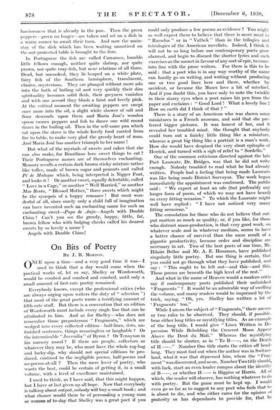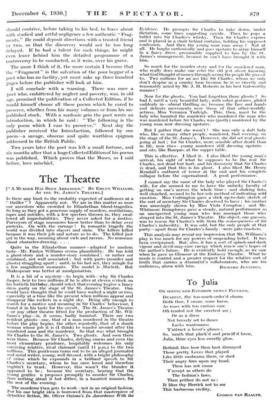On Bits of Poetry
BY J. B. MORTON.
ONCE upon a time—and a very good time it was—I used to think that a day would come when the poetical works of, let us say, Shelley or Wordsworth, would be combed and combed and combed, until only a small amount of first-rate poetry remained.
Everybody knows, except the professional critics (who are always urging upon writers the duty of " selection ") that most of the great poets wrote a terrifying amount of fifth-rate stuff. But there is a convention that an edition of Wordsworth must include every single line that can be attributed to him. And as for Shelley—who does not remember those preposterous " Fragments," which are wedged into every collected edition—half-lines, dots, un- finished sentences, things meaningless or laughable ? Or the interminable "Juvenilia" of Byron ? Or Tennyson in his nursery mood ? If there are people, collectors or whatever they may be, who must have the whole rag-bag and lucky-dip, why should not special editions be pro- duced, confined to the negligible poems, half-poems and no-poems-at-all ? Then the mere lover of poetry, who wants the best, could be certain of getting it, in a small volume, with a level of excellence maintained.
I used to think, as I have said, that this might happen, but I have at last given up all hope: Now that everybody is talking about output, nobody will buy a small book ; and what chance would there be of persuading a young man or wonnat of to-day that Shelley was a great poet if you could only produce a few poems as evidence ? You might as well expect them to believe that there is more meat in " Rasselas " or in " Vathek " than in the trilogies and tetralogies of the American novelists. Indeed, I think it will not be so long before our contemporary poets grow alarmed, and begin to discard the shorter lyrics and such exercises as the sonnet in favour of any sort of epic, to come into line with the prose writers. For there is this to be
said : that a poet who is in any way worthy of the name
can hardly go on writing, and writing without producing one or two good lines here and there, whether by accident, or because the Muses love a bit of mischief. And if you doubt this, you have only to note the twinkle in their starry eyes when a poet raises his pen from the paper and exclaims : " Good Lord ! What a lovely line ! How on earth did I think of that ? "
There is a story of an American who was shown some miniatures in a French museum, and said that she pre- ferred bigger pictures. It was honest of her, and it revealed her troubled mind. She thought that anybody could turn out a finicky little thing like, a miniature, whereas a great big thing like a portrait is a man's work. How she would have despised the very short epitaphs of Herrick, and turned with a sigh of relief to " Sordello."
One of the common criticisms directed against the late Poet Laureate, Dr. Bridges, was that he did not write enough. Nobody troubled to read what he had already written. People had a feeling that being made Laureate was like being made District Surveyor. The work began immediately the appointment was confirmed. The public said : " We expect at least an ode (but preferably any longer form of poem, of which we may not have heard) on every fitting occasion." To which the Laureate might well have replied " I have not noticed very many fitting occasions."
. The consolation for those who do not believe that out- put matters as much as quality, or, if you like, for those who distrust mass-production, is that very good work, on whatever scale and in whatever medium, seems to have a better chance of survival than the mere result of a gigantic productivity, because order and discipline are necessary in art. Two of the best poets of our time, Mr. Hilaire Belloc and Mr. A. E. Housman, have published singularly little poetry. But one thing is certain, that you could not go through what they have published, and say : " This ought to be left out—and this-and this. These poems are beneath the high level of the rest."
And what in the name of Heaven would a modern critic say if contemporary poets published their unfinished "Fragments " ? It would be an admirable way of swelling the volume, and many readers would be impressed by the trick, saying, " Oh, yes. Shelley has written a lot of ' Fragments ' too."
While I am on the subject of "Fragments," there are one or two rules to be observed. They should, if possible.
bear either long titles or mystifying titles. As an example of the long title, I would give " Lines Written in De- pression While Beholding the Crescent Moon Appear Above the Dent du Midi." Whereas the mystifying title should be shorter, as in " To B—, on the Death of H—." Number One title starts the critics off head- long. They must find out when the author was in Switzer- land, what it was that depressed him, where the "Frag- ment" was discovered, and soon. Number Two title should, with luck, start an even louder rumpus about the identity of B—, or whether H— is Higgins or Harris. All of which, the reader will observe, has nothing whatever to do with poetry. But the game must be kept up. I would even go so far as to suggest to any poet who feels that he is about to die, and who either cares for the opinion of pbsterity or has dependants to provide for, that he should contrive, before taking to his bed, to leave about with studied and artful negligence a few authentic "Frag- ments." He could deposit directions with a trusted friend or two, so that the discovery would not be too long delayed. If he had a talent for such things, he might even leave behind him the detailed programme of a controversy to be conducted, as it were, over his grave.
The more I think of it, the more certain I become that the "Fragment" is the salvation of the poor beggar of a poet who has no facility, yet must rake up three hundred pages before the publisher will look at him.
I will conclude with a warning. There was once a poet who, embittered by neglect and poverty, was, in old age, promised the publication of a Collected Edition, if he would himself choose all those poems which he cared to preserve, whether from his many volumes or from his un- published stock. With a sardonic grin the poet wrote an introduction, in which he said : " The following is the only poem which I care to preserve." Next day the publisher received the Introduction, followed by one poem—a savage, obscene and quite worthless epigram addressed to the British Public.
Two years later the poet was left a small fortune, and six months after that a huge CollectedEdition of his poems was published. Which proves that the Muses, as I said before, love mischief.



























































 Previous page
Previous page